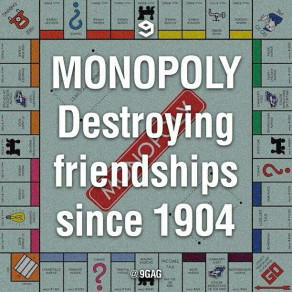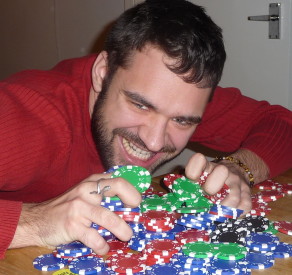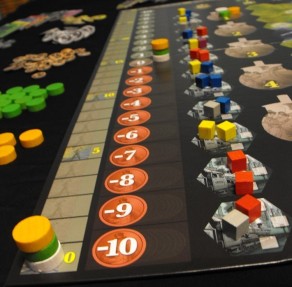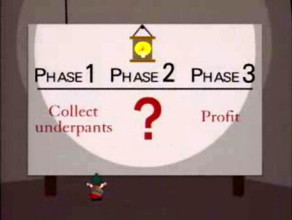
The reputation of board games has been ruined by Monopoly, a game so vile and destructive that it is responsible for more ruined Christmases than the Grinch. In Monopoly, like many other Ameritrash games, there is one resource (money) that everyone fights over, and the one with the most money eliminates the competition and wins the game.
The opposite of Ameritrash is Eurogames, and they follow a different pattern. Eurogames generally have two sets of resources, money and victory points. Money is important early in the game to build up an efficient infrastructure that you later use to score victory points. At the end of the game, the money is worthless as the winner is the one with the most victory points.
I believe life is like a Eurogame, but that most people live as if it was Monopoly. We have a limited number of years (turns) during which we want to live as good of a life as possible, filled with love, happiness, health and sex (victory points). To get these victory points, we need some intermediary resources, like money. But in the end, a bulging bank account does you no good, and only the victory points lead to eudaemonia.
(Eudaemonia is covered in my Mission Statement article. In short, think of it as ‘what makes a good life’.)
What is enough money?
I struck up a conversation with a suit-clad banker in London. I told him about my nomadic life and he dreamily confessed that he dreamed of something similar, and as soon as he had saved up enough money, he would quit his dull job and do it too. “Great!” I said. “How much money do you need?” I got a puzzled look, and he said that he didn’t know. “Well, how will you know when you have enough?” I asked. Again, I got a puzzled look. Mentally, I saw him pinning his target to the horizon, circumnavigating the earth time and time again chasing after an ever-receding goal. This man deals with budgets as a profession, yet he had left the budget of his dreams undefined.
In most Eurogames, the trick for maximizing your victory points is to know when you have enough money to last the rest of the game, and then switch over to gathering victory points. Those, like the banker above, who decide to work hard, save up for an economically stable retirement and then start harvesting victory points live their lives like a Eurogame. It sure is a step up from Monopoly, but it is still misguided.
I think life is like a very special kind of Eurogame that is divided into several unique phases. There are different kinds of victory points for each phase that can primarily be collected in those phases. The kind of experiences, adventures and fun that you can have in your twenties are quite different from the ones you’ll have in your seventies. (Although Viagra is a game changer.)
The elusive Victory Point
So why are we focusing so much on money, something most people will agree doesn’t give us happiness on its own? Why do we stockpile it for that elusive retirement?
It is because money is quantifiable while the victory points are ephemeral. Philosophers have argued over what is a eudaemonic life for millennia, and we have only one lifetime to figure it out best we can. And as is common with large amorphous questions, it is ever so tempting to delay the solving of the riddle for later and focus on something easier, such as doubling your income. After all, whatever ‘it’ is that we want out of life, we most likely are going to need the money, right? So why not just focus on the easy task first (making money) and worry about what we are going to do with it later.
But delaying the inner searching needed to figure out our own passions can become a habit, just as saying “I’ll start the gym tomorrow” too many times turns ‘tomorrow’ into ‘never’.
South Park, as always, has the best analogies for life’s big questions. In episode seven, series two, there are underpants-stealing gnomes that have a three-phased business plan.
- Collect underpants
- ?
- Profit
Of course, that is ludicrous, but is the following life plan much better?
- Make money
- ?
- Happiness / Eudaemonia
Developing our tastes, likes and preferences take time and effort. You can’t go to the library and look up what will make your life meaningful. Google Maps cannot chart a path to eudaemonia. A lifelong trial and error is the only way to find what ‘victory point’ exists for you.
Closing Words
I am not saying that we should not make money (it is useful) or that we should in detail plan our path to eudaemonia (it’d take too long). Rather, I am saying that we need to be mindful of the balance between these two tasks.
If we spend our university days doing nothing but studying, then perhaps you’d get a better job in the future, but you will have missed the imitable university life (who doesn’t want to hang upside down in a dorm room being pelted with eggs?). If you work so hard that you have room for nothing else, then don’t expect a rich social life. And if you never contemplate what you really want out of life, then don’t expect to know it when you retire.
As in the Eurogames, the player who best balances the need for resources with the gathering of victory points wins the game. Focus too much on collecting resources leaves you with no time to spend them on what matters while focusing only on victory points leaves you broke and unable to get them in the first place.






Hi Gussie, said i would read your blog and I did. Although you kinda tricked me by doing a topic on boardgames knowing full well that I wouldn’t be able to resist a read.
Anyhow, I enjoyed it, I liked the way you drew comparisons and metaphor between eurogames and life. I do agree with you, I think finding the balance in life is way forward (but the hardest thing to do.)
The funny thing about life is like you are feeling your way towards a destination in pitch blackness. You don’t know if you are going the right way but you know you got to keep going and hopefully be hit by a blaze of light as you stumble into the meaning and purpose of life.
Life like in eurogames (my favourite by the way is Agricola – my first love) is fraught with certainities – do I have enough to feed my family? Should pick the grain or sheep?? You have a grand plan and try to stumble towards with the hope that at the end you realise that you have enough victory points and you did well.
Oby x
I think a lot of people feel like the path to their eudaemonia/VP/happiness goes through a dark room (no, not that kind of dark room). Some will walk into the darkness and feel their way, but some will just not try, and instead focus on what they *know*, what is *simple*, such as work.
That is what I meant with the need to not just wait with this discovery until after retirement. Feeling our way through the dark will take time, and so we need to get started!
A nice clear description of the two genres and a great analogy.
Besides, Monopoly is bad enough even before the poorly designed, dragged out end game.
A very well written, and lightheared yet poignant prose, which has delighted me and has been surprisingly on point in regard to matters within my own life.
This is just where my head is at at the moment.
Excellent read.
Thanks mate!
Damn, you got me again. Do you have some sort of mind reading power going on?
I have been working for quite some time on getting my life on a new route, busily removing one obstacle after another. Not there yet but so close I can start to taste the sweet, salty , and probably a little sour of it. MONEY has been a huge focus. Will I have enough? Can I afford to go where I want to go?
There are days I am overwhelmed by the Monopoly mind set, most likely because of the other player in the game, but there are other days, and they are becoming more and more frequent, when I just say ” ‘F’ it, this is what I need, I can make it work, I’m doing it.”
A combination of excitement and panic then sets in. It’s o.k. though as it is all rather invigorating.
I DESPISE Monopoly.
I get a huge charge out of Skip Bo however which is silly and simple, no brain cells need to be over tasked, and a glass of wine makes it even more fun.
I know that you intended this post to be a more focused and metaphorical discussion on the eudaemonic life, but for me it was a lesson in BOARD GAMES! No wonder I’ve never taken to board games. I was playing Ameritrash! Honestly, I could see you inventing a boardgame – maybe founded on Burning Man principles.
It’s funny because you might remember I always declined boardgame nights. That is partly because I had equated them with computer games which, while they might improve your manual dexterity, are a colossal waste of time (because you could be doing something more creative). But that is obviously off-point because boardgames can be social occasions….nor do they improve manual dexterity if you are drinking the whole time.
Secondly, the last time I played Monopoly years ago I realised it brings out the worst in people and is a kind of raw reflection of the business world. I said to my flatmate after she won $10 in a beauty contest, “yeah, that’s about all you’re worth”.
I was a bad person, so I said to myself “never again”.
The question of “when is enough, enough?” that your banker guy faces is the tough part we all have to confront. As you grow more wealthy your lifestyle changes and you become accustomed to it; hence the infinite quest for more.
However, in the real world we do have to consider whether we will be destitute when we are older and linger for years in poverty before miserable death. That is the fear that drives society.
For most people it is hard to break out of that mindset.
So, the obvious solution is that we freeze everyone when they get to, say, 70 years old and figure out what to do with them later.
Who’s with me?
Don’t tell me that the reason you didn’t join our drunken games was a simple misunderstanding. When I get back to London early August, you must join us for a game. I think you’ll like it. (It is even better than Maxi-Yatzy.)
I am often told of this inevitable increase in lifestyle costs as your wages increase, but I don’t buy it. There is no inherent link between the two. We can keep our simple pleasures even if our wages increase. And if we do, we will be able to retire earlier, or go down in hours.
As always on this blog, I would never tell anyone that one way is the right way, but I want people to reflect on their options. Will a flashy lifestyle coupled with an intensive work situation make you happier than a simpler lifestyle with more free time? There is no objective right answer, but the question is still important.
As for freezing myself at 70…. Nah. Give humanity a few decades and there will be a huge war followed by a massive famine, and who will be the first to be cannibalized if not the lifeless guy in the freezer…
And that reminded me of this article on how to afford to travel. One of the tips is to minimise spending even when your wages go up so you can save. Simple but it runs counter to the assumption that lifestyle “has to” become ever more expensive.
I completely agree about maintaining a humble lifestyle with simple pleasures, but somehow it doesn’t seem to happen. Such is the seduction of wealth. Given our animal origins (eat and fuck as much as you can while the going is good) it is completely understandable. Humans suck that way. But we went to the moon which was cool.
My life is a constant reflection of options – trying to work out the happiest existence. Overworking has never been a problem or even a temptation; but that is more luck than design so I try not to judge those that work long hours too much. I just feel sorry for them (which is a form of judgement – derp).
The clever thing about freezing at 70 is that you are probably dead anyway; but having accepted the carbonite fate you think there is at least a chance of being ressurrected at a later date. It is kind of like buying a lottery ticket or buying into a religion – it is probably a flight of fancy, but there is a chance it might work out.
It is painless at any rate, being a frozen TV dinner. Better than suffering through dimentia or cancer…..which might happen anyway before 70, but I was just trying to suggest a good cut-off point. 60 seems too young these days.
“They” must have done a movie about this. Which undoubtedly would have sinister overtones. But it doesn’t have to be.
You should check out a Channel 4 drama (just six episodes) called “Utopia”; which is a bit analogous to this idea. Sometimes its hard to know who the bad guys are in the human race. There is a good line in Utopia that says something like Genghis Khan was the greatest environmentalist who ever lived because he killed 40 million people which meant there was no one to farm the land and it could re-forest and recover from centuries of being exploited.
I don’t know if that figure is correct (sounds high to me) but you get the idea. The human race is a scourge but on an individual level we are all precious. That is the insurmountable paradox of our age.
If a board game evening will solve that paradox, I’m in.
Jono, I know we always land in religion whenever we start philosophising, so why break the pattern. I wonder what religious leaders will say about freezing people. Do their souls go to heaven? If so, what if we revive them? Do they become soulless zombies or are their souls dragged out of heaven and into their frostbitten old bodies? If the latter, then I would be pissed off!
Or do their souls wait around until the body is properly destroyed? If so, then that would be a fantastic way to escape hell! Live as a bastard and then freeze your body forever!
Indeed. Why break tradition.
I would go for the last option. Your “soul” exists in stasis while life is possible. Han Solo could have been frozen forever on Jabba’s wall but it was always possible to come back for a sequel.
Did they (religions) ever come to a ruling on euthanasia/assisted suicide? (i.e. do you go to hell if you are sick and want to die? because suicide is a ticket to hell). That could be kind of analogous to the frozen proposal. However, I would distinguish it by, if you believe your body is being preserved for later revival (which is what I would choose to believe), then it is not suicide. So that in itself is not damnation.
Besides, God is patient and in heaven time has no meaning, so being frozen for a million years before you are no longer viable does not really matter so far as your soul is concerned.
Time and space constrains our thinking, our physical form is largely defined by the planet we evolved on (although there is a possibility that there might be universal truths, like the symmetry of the body), whereas external dimensions like “Heaven” are not so constrained.
The priest shouldn’t have too much of a problem with it….but they probably will anyway.
Whoooooo boys, I am just a few months away from 70. I think 85 is a better age to freeze someone…. but not me when or if I make 85. As for all that other heavy stuff, its too deep for me. I say ” Eat, drink, and fuck all you can as often as you can.”
Sage advice indeed! Fat, drunk and happy is not a bad way to be.
Hmm, that didn’t come out right. I just imagined the consequences of literally eating, drinking (alcohol) and fucking as much as I can.
It would probably throw your PX90 workout regime out the window!
It is noteworthy that my own parents are 69 (I mean years old, not locked into a geriatric sexual embrace – oh christ, now my eyes are bleeding) – so I have no actual desire for them to face impending freezing next year.
However, it is a useful thought experiment that addresses the cataclysm of our modern age….which is how to pay for all the old people when birth rates are falling (which they have to do in order to avoid environmental collapse). The traditional method of taking care of the aged was to have lots of children. That model has naturally declined in the “civilised” nations where consumerism and debt slavery* has taken over.
I don’t even have any debt and I have still more or less written off the conscious decision of having a second child as environmentally reckless.
I say “conscious decision” because mistakes happen. Just like the first!
*note: debt slavery has probably always been there…and certainly in developing countries as well, so I suppose we can’t pin it on that. Studies tend to suggest that education and access to information result in declining birthrates. Women realise they don’t just have to be baby factories and they have a choice.
My solution, if someone would be crazy enough to vote me into power, would be to sterilize the entire population of my country. We would be completely reliant on imported labour. As a nation, we wouldn’t have to spend a penny on raising and educating children, and there would be no annoying children’s TV. The money saved would be spent on paying competitive salaries so highly skilled foreigners would come here and work.